by M. C. Jennings | Dec 14, 2018 | Academics, COBA Faculty, COBA Staff, Current Students, Faith Infusion, School of Information Technology and Computing, Uncategorized
It’s graduation day for our December graduates and we wanted to take one more opportunity to celebrate this milestone in their lives. Last week, on December the 4th, COBA hosted a luncheon in their honor celebrating them and all of the hard work that has helped them reach this day. Faculty, staff and students enjoyed fellow-shipping with each other, learning more about students’ favorite experiences at ACU and what advice those that were a little older would give them as they go out into the world.
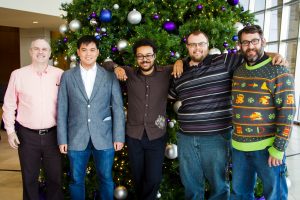
It’s our tradition for a faculty member to give a blessing over the graduates as we say goodbye to them. Dr. David Perkins, Professor of Accounting, did this in an unusual way this year. Known for his guitar ballads in class, he chose to sing the blessing over them with a David Perkins original song.
We hope you’ll enjoy hearing his message to the students as well as seeing some pictures from the event. To the class of 2018 we say thank you for choosing ACU, for investing of yourself in the process, and for making us all better people during your time here. May God bless you and give you 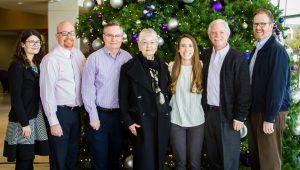 wisdom and direction knowing that He has designed you for His purpose and good works, which he has planned and prepared in advance for you to do.
wisdom and direction knowing that He has designed you for His purpose and good works, which he has planned and prepared in advance for you to do.
To view the video, click here.
To view all of the pictures from the luncheon, click here.
by Hanna Roberts | Oct 18, 2018 | Careers In..., COBA Events, Current Students, Uncategorized

Students speak with Jeff Campbell of Southwest Airlines.
You may have heard it said before, but ACU’s College of Business Administration is not your typical business and technology school. Our mission is to educate business and technology students for Christian service and leadership throughout the world. We do this by providing exceptional academics, fostering spiritual growth, and providing students with unique opportunities to interact with professionals during their time here. We work hard to give students exposure to a variety of different businesses that lead to internships and entry0lvel career opportunities.
In October, ten different companies came to campus to speak in classes and lunches, participate in networking events and career fairs, and host on-campus interviews for jobs and internships. Southwest Airlines, Brazen Animation, USAA, Faithlife, KPMG, and PWC are just a few of the companies that come to network and recruit our students through these events. Anna ter Kuile, a senior computer science major from Nashville, Tennessee attended a networking lunch with USAA in the fall of 2017. She had the
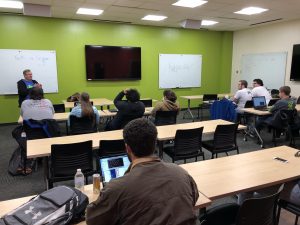
David Mitchell from Faithlife Corporation speaks to a class.
opportunity to meet and connect with employees at USAA and ended up receiving an internship as a software developer and integrator in the summer of 2018. ter Kuilereceived another internship offer from USAA at the end of the summer and plans to work for them again in 2019. “The personal connections I made at the information lunch on campus were invaluable in the hiring and application process,” said ter Kuile. “It gave me an edge over other applicants and I was able to really see the culture of USAA through that event, which made me want to work there even more. Attending that event opened doors for me that I did not know were there and helped me build a foundation for my future career.”
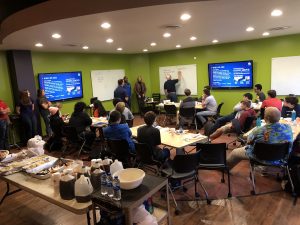
Employees from USAA speak with students at a networking luncheon.
Attending events like these has a wide variety of benefits for students. The most obvious benefit is the potential of internships and jobs that influence careers. These opportunities allow ACU students to get a foot in the door with companies that have competitive hiring. Another benefit is developing the discipline and networking skills necessary in the professional world. Students can practice professional development by not only signing up for the events, where they will network and learn about the professional world, but by being committed, disciplined, and following through by showing up to that event. They can also practice conversation skills and make meaningful contacts with companies.
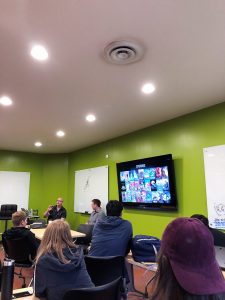
Employees from Brazen Animation speak in a class.
In order to take advantage of these incredible opportunities and events, we advise that students take the time to read their newsletter. Once a week, COBA & SITC send out a newsletter through email that contains everything the student needs to know – special announcements, event promotions, chapel information, giveaways, and more – for the following week. In less than a minute, students can scroll through and see what is going on in the college and sign up for anything they might be interested in. We also promote events on our blog and social media, and monitoring those also helps students to take advantage of special opportunities in our college.
As a student at ACU’s College of Business Administration, we hope you will take advantage of the many professional development resources that are available to you. Be sure to read your newsletter and follow us on social media to stay up to date with the latest in COBA.
by Hanna Roberts | Oct 12, 2018 | COBA Events, Distinguished Speakers Series, Faith Infusion, Special Speakers, Uncategorized
Last week, COBA partnered with the Lytle Center for Faith and Leadership to host our annual Distinguished Speaker Series. We were honored to have Horst Schulze as our guest this year. Schulze was born in a small German village and knew he wanted to work in hotels at age 11. He left home at 14 to be a busboy and the rest, as they say, is history. Schulze spent nine years with Hyatt Hotels Corporation before becoming a founding member and president of The Ritz-Carlton Hotel Company. After resigning from The Ritz-Carlton, Schulze is now the chairman and CEO of Capella Hotel Group, an ultra-luxury hotel chain. 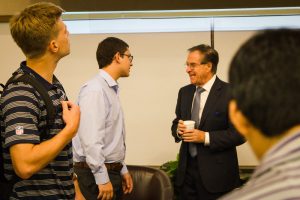
Schulze spent his time in Abilene connecting with students, faculty and staff, and community and university leaders conversing about exceptional customer service and what it means to be a leader striving for excellence. He shared stories from his years in the hotel industry and the absolute importance of having a vision and a purpose. Schulze advised that the steps to success are vision, commitment, and initiation. You must have a dream, a vision, to guide what you do and define what you are working toward. The dream becomes more than just a dream when you commit to it and decide to carry it out. Carrying it out entails taking the first step, initiating, and persevering to make the dream and vision a reality. Especially as a leader, the vision is very important and gives meaning and information to everything you do. According to Schulze, being a leader implies that you have something in your mind that you are bringing people to. People respond not to rules and orders, but to objectives and motives. Schulze shared that he thought it was immoral to hire people to fulfill functions; you hire people to join the vision and become a part of the dream.
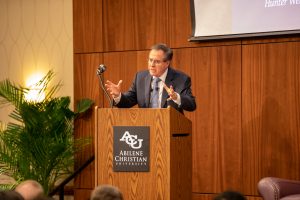 Schulze also spoke about a seeming contradiction: what it means to be the best in the world but to live a life as Christian where we are called to not be of the world. In scripture, we are consistently reminded that our citizenship is in heaven, how we should not conform to the world, and how it is likely that the world will hate us because we are not of it. This leaves many questioning how can we be in the world, but not of the world. Schulze shared how he struggled with working in the luxury hotel business and wanting to create the very best hotel in the world, but not being sure how that connected with his calling as a Christian. He then realized that this was an opportunity to be an example and show the kingdom to the world. It all connects back to Schulze’s personal vision for his life: to be excellent in every role he fills. Excellence in how he treats and grows his employees, excellence in serving customers and shareholders, excellence in every aspect of his hotels points back to Christ. Creating the best hotel in the world sets his hotels apart and creates an example for others. Schulze believes that if we are not living with a mission to be excellent and not using our God-given gifts and abilities, then we are not fully living in every way we can for Christ. Being an example of excellence while living for Christ allows others to see Him through you and points people back to Him. Scripture also reminds us that being holy implies being different and unique. By being excellent, you are set apart like we are called to be.
Schulze also spoke about a seeming contradiction: what it means to be the best in the world but to live a life as Christian where we are called to not be of the world. In scripture, we are consistently reminded that our citizenship is in heaven, how we should not conform to the world, and how it is likely that the world will hate us because we are not of it. This leaves many questioning how can we be in the world, but not of the world. Schulze shared how he struggled with working in the luxury hotel business and wanting to create the very best hotel in the world, but not being sure how that connected with his calling as a Christian. He then realized that this was an opportunity to be an example and show the kingdom to the world. It all connects back to Schulze’s personal vision for his life: to be excellent in every role he fills. Excellence in how he treats and grows his employees, excellence in serving customers and shareholders, excellence in every aspect of his hotels points back to Christ. Creating the best hotel in the world sets his hotels apart and creates an example for others. Schulze believes that if we are not living with a mission to be excellent and not using our God-given gifts and abilities, then we are not fully living in every way we can for Christ. Being an example of excellence while living for Christ allows others to see Him through you and points people back to Him. Scripture also reminds us that being holy implies being different and unique. By being excellent, you are set apart like we are called to be. 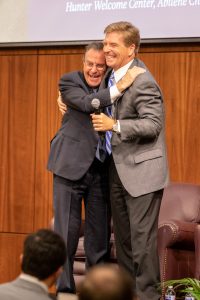
Schulze’s messages were eloquent, inspiring, and convicting. Below are some of the testimonies that students shared after listening to him:
“This was the best part of my entire semester. I heard him in the morning and at the luncheon and wish I could have had him in all of my classes. I have a renewed commitment to living out my calling with Christ.”
“Horst made me grateful to be at ACU. I never realized how special this place was until I heard this accomplished man come to us and tell us that we bring him hope by what we do and how we aren’t ashamed of Christ.”
“The way he stayed consistent with his vision over his entire career is so impactful – I just want to live better after hearing him.”
“How often do you hear about someone who worked their way up from washing dishes and busing tables to running the #1 hotel brand in the world? This means we have to start being our best right now, where we are.”
It was our pleasure to have hosted Horst Schulze this year. To view pictures from the DSS luncheon, click
here.
by M. C. Jennings | Oct 2, 2018 | Academics, Accounting, COBA Faculty, Current Students, MAcc, Uncategorized
Our last installment in our COBA Study Abroad series highlights the MAcc (Master in Accountancy) trip to Australia and New Zealand, led by Dr. Curtis Clements and Dr. Kyle Tippens. MAcc students received credit for International Accounting and Financial Reporting and International Financial Markets. We can’t think of a better way to learn about global business than being immersed in it! We asked Dr. Clements to tell us what it’s like to learn in the land down under.
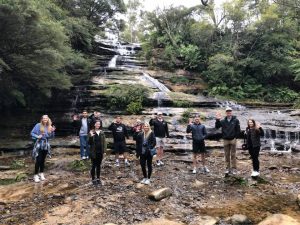
What made your destination a unique place to study?
We didn’t really have a home city. Instead, we traveled to three cities: Sydney and Melbourne in Australia and Auckland in New Zealand. We chose Australia and New Zealand because we had business contacts there and for their diverse cultures.
What businesses were you able to visit?
We visited a number of companies and organizations. These include PWC, KPMG, EY, the Sydney Wool Exchange, The Australian Accounting Standards Board, The Australian Auditing Standards Board, ANZ Bank, Australia-New Zealand Chartered Accountants, and Xerox.

Did you take the students on any sight seeing tours?
In Sydney we went to Taronga Zoo. Taronga is a world-class zoo with many different animals from around the world. We also took a nighttime harbor cruise during the Vivid Sydney festival, which was outstanding. In Melbourne, we took a trip outside the city on a train powered by a steam engine. In New Zealand, we toured Hobbiton where the Lord of the Rings movies were filmed as well as the Hobbit movies. We also went to the Te Puia Maori Village cultural center in Rotorua. On their own, the students also traveled to the Blue Mountains, Manly Beach, and Bondi Beach in Sydney. They attended an Aussie Rules football game, went to Brighton Beach, and watched the penguins come ashore in Melbourne. In New Zealand, the students traveled to several locations outside of Auckland.
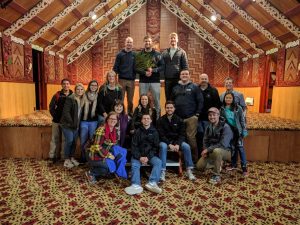
What is it like to be able to spend so much time with students in another country? How does it differ than being in a classroom setting in Abilene?
The experience was outstanding! You get to know the students so well and they get to know you beyond what they see in the classroom. It allows you to speak into their lives on a much deeper level. We learned so much about the students and, hopefully, they know us and our families better.
What were your favorite moments/experiences of the trip?
Two things stood out for me. First, my wife and I were able to renew friendships with people we haven’t seen in 27 years. As far as the academic part of the trip, there are so many things that were enjoyable and informative. I don’t think we had a bad visit and it is really hard to point to one thing. It was interesting as I was reading the students’ journals as they would say, “This is the best thing on the trip!” And then just a day or two later, they would say the same thing! As far as the sightseeing, I would have to say the trip to Hobbiton was the best thing we did.
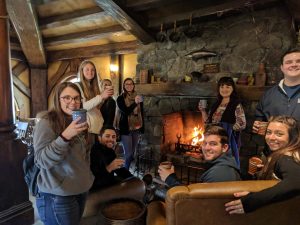
If students could only learn one thing, what do you hope they learned?
That we live in an interconnected world. This is especially true in business. As an aside, I also hope they learned that what we teach and tell them in class really matters!
Anything else I’ve forgotten to mention that you would like to talk about?
We have some outstanding students!
by M. C. Jennings | Sep 14, 2018 | Academics, COBA Faculty, Current Students, Faith Infusion, Social Entrepreneurship, Student Spotlights, Uncategorized
COBA professors and students were world travelers this summer, as we have covered in parts 1 and 2 of our blog series on our study abroad trips. This July, professors Laura and Mark Phillips took students to Central America where they received course credit in MGMT 419 (Global Entrepreneurship) and MGMT 340 (Fundamentals of Life Design). We asked Dr. Laura Phillips to tell us about their experience. We hope you enjoy the third installment of our four part blog series on the 2018 travels of the COBA Study Abroad program.
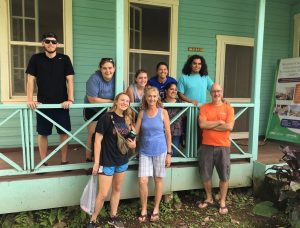
What made Central America a unique place to study?
Central America is a unique place to study Global Entrepreneurship because while the culture, laws, and economic environment are different from the United States, Central America is a place with lots of start-up businesses. Also, the people are very hospitable which makes visiting start-ups easier. In addition, Central America is small geographically but the different countries are unique. Some of the challenges of starting a business in Costa Rica are different from the challenges of starting a business in Honduras. Finally, we were able to see first hand how the government can drastically alter the business environment; the recent unrest in Nicaragua is an unfortunate example of the instability inherent in emerging economies.
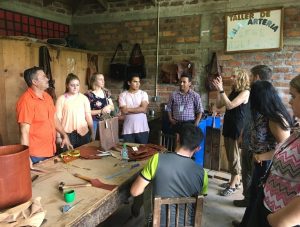
What businesses were you able to visit?
I’m not even sure where to start here. I guess I’ll just make a list.
San Jose, Costa Rica
- Yuxta Energy–solar energy
- e.e.d.–legal services for social ventures
- VivaIdea–a think tank for increasing the impact of entrepreneurship in Latin America
Guanacaste region
- Vida Adventura–adventure camp
- Hotel Las Tortugas–small private hotel in Playa Grande
- Taco Star–taco shop on the beach
Sarapiqui region
- Chilamate Rainforest Eco Retreat
Turrialba region
- CATIE University and the Sustainability House
- butterfly farm
- dairy/cheese making business
- beneficial plants business (medicinal, herbs, etc.)
- pueblo tourism business
Honduras
- Mission Lazarus–here we also
- made organic fertilizer
- conducted a half day training session for the students and teachers at the vocational schools on basic business topics
- hardware store
- bootmaker
- trash collector/recycler
- restaurant owner
- coffee farm/barber shop/tienda owner
For the most part we visited with the entrepreneur (or an employee for the larger organizations) to learn about what they do, what the biggest challenges are, how/if they plan to grow, etc.
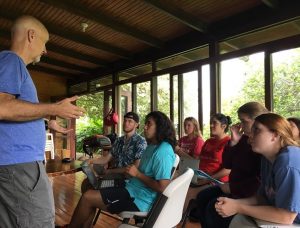
Did you take the students on any sight seeing tours?
- Walking tour of San Jose
- Ziplining at Vida Adventura
- Horseback riding at Vida Adventura
- Surfing lessons at Playa Grande or
- Canoeing on the estuary at Playa Grande
- Birdfinding nature walk
- Hike to waterfall and swimming
- Cultural scavenger hunt (milking cows, Latin dancing, making tortillas, etc.
- Archaeological tour
The students enjoyed the sightseeing activities. They were a lot of fun.
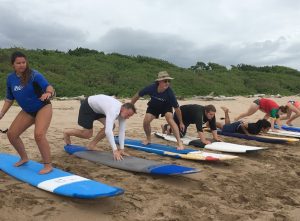
What is it like to be able to spend so much time with students in another country? How does it differ than being in a classroom setting in Abilene?
This particular study abroad is different from going to Oxford or Leipzig because we really are all together most of the time. There were even a couple of places where we stayed in one big house. It’s very different because in Abilene you are with your students in class and then they do their own thing the rest of the time. On this study abroad we usually eat together, we travel together, we spend much of our free time together, plus we have class together. You really get to know each other and, as the students said, you become more like family.
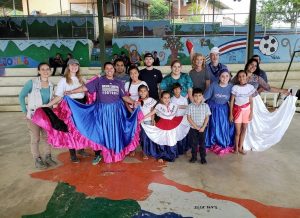
What were your favorite moments/experiences of the trip?
Well, I love the fact that we are outside so much and that even when you are “inside” you are usually outside. In many ways life is harder but in many ways it’s simpler. The pace of life is slower and the people put more emphasis on relationships than on to-do lists. Most of our students found the Latin pace therapeutic. There were many great experiences but one of my favorites was going in the butterfly house. The house was full of flowers and the butterflies seemed like flying flowers. It was beautiful.
I also loved watching our students conduct the business training for the people at Mission Lazarus. That activity was a real challenge and stretch for our students, especially since we were having to work through a translator. They students rose to the challenge and did a fantastic job!
If students could only learn one thing, what do you hope they learned?
I would want our students to learn that people are people everywhere; we are more similar than we are different. I would want them to learn that there are business opportunities everywhere but that to be successful you MUST know the culture and context of the place in which you are operating. I would want them to know that the fast-paced, individualistic, climb to the top American business style is not the only way to live. I would want them to know that being happy and being successful are not directly tied to a salary amount or prestige. (So…that’s four things, but they are kind of related.)
by Hanna Roberts | Sep 11, 2018 | Uncategorized
What does it look like to be a Christian businessperson?
It is not always clear how to live out our faith. As Christians, we are called to put God first and live out His purpose for life by being disciples, but it is sometimes hard to ascertain what that purpose is and what being a disciple looks like when it comes to our daily lives, families and friends, and careers, especially in business. Some aspects of business seem lacking in character and integrity; we often associate business with underhanded competition, being greedy and profit-driven, and doing whatever it takes to climb the corporate ladder. It can seem like a dark and unnavigable place to live as a disciple on mission for Christ. However, it is possible to work in business while being on mission for God.
The discord happens when we are not living our faith intentionally across our lives. When it comes to our profession, we often first consider our path from a career perspective and then try to fit that career with how we are called to live by Christ. This can result in us compartmentalizing these aspects of our life because the fit is unclear, we fear causing discomfort among our colleagues, and, simply put, it is hard. It is much easier to go to church on Sunday and then be an accountant on Monday. It is far more difficult to be a disciple who is also an accountant and to live out your faith through your attitude, practices, and conversations at work. But we must take time to consider what it looks like for us to be a Christian businessperson.
Even before entering the professional environment, we struggle with what it looks like to be a Christian professional. Students spend four years studying, training, and preparing to enter their chosen field, yet many students struggle to see how they can take what they have learned academically and merge that with what they have learned spiritually during their time in college. Balancing our calling as a discipleship with a professional career is difficult, especially as students begin to enter life after graduation and must discern what job is right for them, organizing their priorities, and focusing on hearing God’s voice.
This year at Summit, the Business Wholeness Pathway will be examining what it looks like to merge these callings of discipleship and profession. We will hear from several speakers about how they used their training and careers in business to work fully committed to Christ. We invite you to attend the sessions on Tuesday, September 18th in Hart Auditorium. You can read more about the Pathway and each of the speakers here: http://blogs.acu.edu/summit/business-wholeness/

 wisdom and direction knowing that He has designed you for His purpose and good works, which he has planned and prepared in advance for you to do.
wisdom and direction knowing that He has designed you for His purpose and good works, which he has planned and prepared in advance for you to do.




 Schulze also spoke about a seeming contradiction: what it means to be the best in the world but to live a life as Christian where we are called to not be of the world. In scripture, we are consistently reminded that our citizenship is in heaven, how we should not conform to the world, and how it is likely that the world will hate us because we are not of it. This leaves many questioning how can we be in the world, but not of the world. Schulze shared how he struggled with working in the luxury hotel business and wanting to create the very best hotel in the world, but not being sure how that connected with his calling as a Christian. He then realized that this was an opportunity to be an example and show the kingdom to the world. It all connects back to Schulze’s personal vision for his life: to be excellent in every role he fills. Excellence in how he treats and grows his employees, excellence in serving customers and shareholders, excellence in every aspect of his hotels points back to Christ. Creating the best hotel in the world sets his hotels apart and creates an example for others. Schulze believes that if we are not living with a mission to be excellent and not using our God-given gifts and abilities, then we are not fully living in every way we can for Christ. Being an example of excellence while living for Christ allows others to see Him through you and points people back to Him. Scripture also reminds us that being holy implies being different and unique. By being excellent, you are set apart like we are called to be.
Schulze also spoke about a seeming contradiction: what it means to be the best in the world but to live a life as Christian where we are called to not be of the world. In scripture, we are consistently reminded that our citizenship is in heaven, how we should not conform to the world, and how it is likely that the world will hate us because we are not of it. This leaves many questioning how can we be in the world, but not of the world. Schulze shared how he struggled with working in the luxury hotel business and wanting to create the very best hotel in the world, but not being sure how that connected with his calling as a Christian. He then realized that this was an opportunity to be an example and show the kingdom to the world. It all connects back to Schulze’s personal vision for his life: to be excellent in every role he fills. Excellence in how he treats and grows his employees, excellence in serving customers and shareholders, excellence in every aspect of his hotels points back to Christ. Creating the best hotel in the world sets his hotels apart and creates an example for others. Schulze believes that if we are not living with a mission to be excellent and not using our God-given gifts and abilities, then we are not fully living in every way we can for Christ. Being an example of excellence while living for Christ allows others to see Him through you and points people back to Him. Scripture also reminds us that being holy implies being different and unique. By being excellent, you are set apart like we are called to be. 








